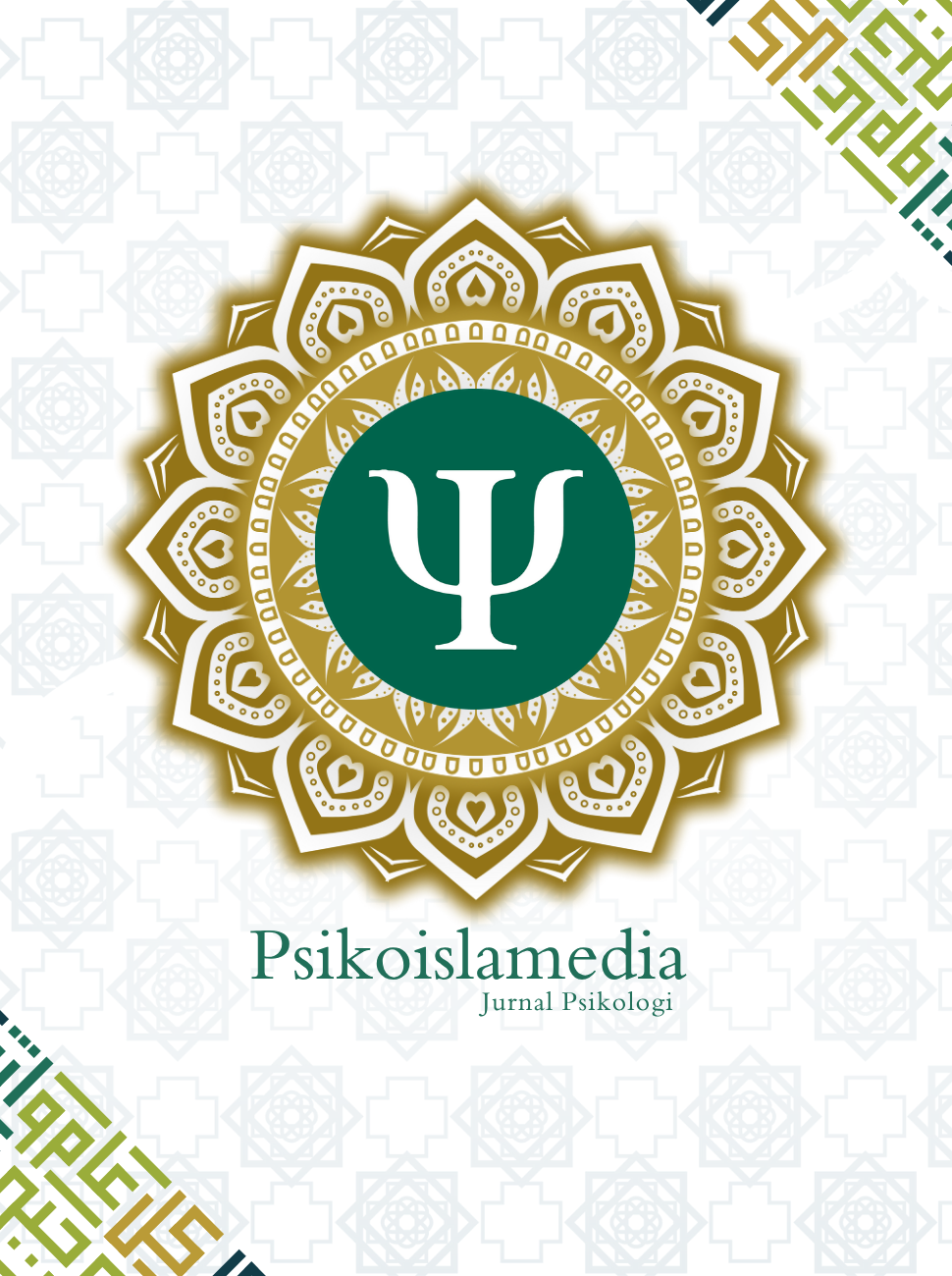PSIKOLOGI GURU PROFETIK
DOI:
https://doi.org/10.22373/psikoislamedia.v3i1.2858Keywords:
Kata Kunci, Psikologi guru, Hadits, ProfetikAbstract
Abstrak Tulisan ini dilatarbelakangi oleh dampak globalisasi yang hedonis yang membuat adanya pergeseran kompetensi, karakter, dan spiritual guru dari hakikat yang sebenarnya. Hal ini berbeda dengan guru zaman dulu yang mempunyai karakter dan kepribadian hakiki seorang guru, yakni mempunyai nilai-nilai luhur keagamaan yang mampu memberikan kemajuan bagi anak didiknya. Hal ini kemudian membuat sikap dan penghormatan siswa, orangtua, dan masyarakat terhadap guru sangatlah berbeda dibandingkan dengan sekarang. Mengapa hal ini bisa terjadi? Hal ini terjadi karena guru tidak memiliki kompetensi yang wajib dimiliki oleh seorang guru. Karena itulah, berdasarkan Permendiknas No. 16 Tahun 2007, seorang guru harus memiliki beberapa kompetensi wajib, dan tulisan inilah yang akan mendeskripsikannya. Artikel ini berusaha mengkorelasikan kompetensi wajib yang ada di Permendiknas No. 16 Tahun 2007 dengan hadits-hadits terkait kompetensi guru, dan juga mengaitkannya dengan teori psikologi. Hasil kajian menemukan bahwa guru harus dibekali kompetensi spiritual agar bisa mendukung empat kompetensi wajib dalam permendiknas, yaitu kompetensi pedagogis, sosial, kepribadian, dan profesional. Kata Kunci: Psikologi guru; Hadits; Profetik Abstract This paper is motivated by the impact of hedonistic globalization that makes teacher's competence, character, and spirituality change. It is different from teachers of the prophet era who have the character and the essential personality of a teacher, which have the noble religious values that can provide progress for their students. It has an impact on the reduction of attitudes and respect for students, parents, and society towards teachers. Why did it happen? It happens because the teachers do not have good competence. Therefore, based on Permendiknas No. 16 th of 2007, a teacher must have some core competencies, and this writing will describe it. This article attempts to correlate the core competencies in Permendiknas No.16th of 2007 with the hadiths related to the competence of teachers, and also relate it to the theory of psychology. The results of the study found that teachers should have spiritual competence in order to support four core competencies in Permendiknas namely pedagogical, social, personality and professional competence. Keywords: Psychology of teachers; Hadith; PropheticReferences
DAFTAR PUSTAKA
Al-Bukhari, Abu Abdullah Muhammad bin Isma'il bin Ibrahim bin al Mughirah bin Bardizbah, al-Jami’ As-Shahih (Shahih Bukhari), Juz 4
Arends, Richard I. (2008). Learning to Teach, Belajar Untuk Mengajar.
Yogyakarta: Pustaka Pelajar
Chirzin, Muhammad. (2015). Kearifan Semesta: Inspirasi untuk
kesuksesan dan kebahagiaan. Jakarta: Gramedia.
Cubukcu, Feryal. (2010). Student teachers’ perceptions of teacher
competence and their attributions for success and failure in learning. The Journal of International Social Research 3.10 : 213-217.
Hadis, Abdul dan Nurhayati. (2012). Manajemen Mutu Pendidikan. Bandung: Alfabeta.
Hikmat. (2011). Manajemen Pendidikan. Bandung: Pustaka Setia
Jakarta: Kencana.
Khon, Abdul Majid. (2012). Hadis Tarbawi: Hadis-Hadis Pendidikan. Jakarta: Kencana
Kokkinos, Constantinos M. (2007). Job stressors, personality and burnout in primary school teachers. British Journal of Educational Psychology 77.1: 229-243.
Munir. (2010). Kurikulum Berbasis Kompetensi Teknologi Informasi dan Komunikasi. Bandung: Alfabeta.
Mutohar, Prim Masrokan. (2013). Manajemen Mutu Sekolah: Strategi Peningkatan Mutu dan Daya Saing Lembaga Pendidikan Islam. Yogyakarta: Ar-Ruzz Media.
predictors of engagement, emotional exhaustion, and motivation to leave
Purba, Johana. (2013). Pengaruh dukungan sosial terhadap burnout pada guru. Jurnal Psikologi 5.01.
Samosir. Jakarta: Indeks.
Santrock, John W. (2008). Psikologi Pendidikan, terj. Tri Wibowo, Jilid 2, Jakarta: Kencana.
Shernoff, E. S., Mehta, T. G., Atkins, M. S., Torf, R., & Spencer, J. (2011). A
qualitative study of the sources and impact of stress among urban
teachers. School mental health, 3(2), 59-69.
Skaalvik, E. M., & Skaalvik, S. (2016). Teacher stress and teacher self-efficacy as predictors of engagement, emotional exhaustion, and motivation to leave the teaching profession. Creative Education, 7(13), 1785.
Slavin, Robert E. (2008). Psikologi pendidikan Teori dan Praktek, terj. Marianto Samosir. Jakarta: Indeks
Solimeno, Andrea, et al. (2008). The influence of students and teachers characteristics on the efficacy of face-to-face and computer supported collaborative learning. Computers & Education 51.1: 109-128
stress among urban teachers. School mental health, 3.2 : 59-69
Suhartono, Suparlan. (2008). Wawasan Pendidikan: Sebuah Pengantar Pendidikan. Yogyakarta: Ar-Ruzz Media
the teaching profession. Creative Education, 7.13: 1785-1799
Wentzel, K. (2010). Students’ relationships with teachers. Handbook of research on schools, schooling, and human development : 75-91
Yogyakarta: Pustaka Pelajar.
Zakaria. A. (2003). Jadul Muta’alim. Garut: Ibn Azka.
Downloads
Published
Issue
Section
License
Authors who publish in this Journal agree to the following terms:
- Authors retain copyright and grant the journal right of first publication with the work simultaneously licensed under Attribution-ShareAlike 4.0 International (CC BY-SA 4.0) allows others to share the work with an acknowledgment of the work's authorship and initial publication in this journal.
- Authors are able to enter into separate, additional contractual arrangements for the non-exclusive distribution of the journal's published version of the work (e.g., post it to an institutional repository or publish it in a book), with an acknowledgment of its initial publication in this journal.
- Authors are permitted and encouraged to post their work online (e.g., in institutional repositories or on their website) prior to and during the submission process, as it can lead to productive exchanges, as well as earlier and greater citation of published work. (See The Effect of Open Acces)














